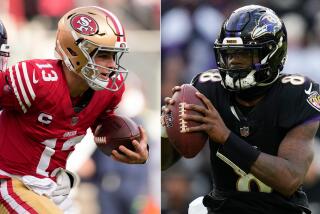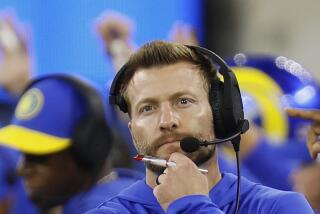Redskins Have Managed to Stay With Best While Replacing Stars
They’ve played 10 games in the NFL, enough to have a pretty good sense of who’s real and who’s Memorex. If you read the New York newspapers, you know that both Jersey teams, the Jets and the Giants, are already in the Super Bowl.
Since seating is limited, I guess that means the Washington Redskins are out. But for the benefit of those who cling to the illusion that some forms of intelligent life managed to resist the lure of a townhouse on aromatic Staten Island, let’s just pretend that the bids to the Super Bowl aren’t sealed.
Parity, by the way, is as dead conceptually as synfuels. It simply has not happened. Instead of solidifying into one great monolithic mass in the middle, this year’s NFL is more spread than ever. Only New Orleans and Seattle are 5-5--the ideal world, according to Pete Rozelle. Nine of the 28 teams have won 3 or fewer games; 8 have won 7 or more. As frustrating as this must be on Park Avenue, the NFL has evolved into separate but nominally equal systems, like two moons, one warm and one cold, in parallel orbits.
The Redskins, as usual, are on the warm moon, and they’re one of the hotter inhabitants. They’re 8-2. Only the Jets have a better record: 9-1. Only Denver, Chicago and the Giants have records as good. The Redskins are probably the most surprising entry in this group, having cut their longtime offensive stars, John Riggins and Joe Theismann, before this season.
George Rogers apparently supplanted Riggins as the primary running back toward the end of last season, giving fans reason to believe that performance at that position would not decline. But even the most strident Theismann-hater had to wonder if Jay Schroeder could continue at the level he set when he replaced Theismann in the 11th game last season.
Schroeder has completed 16 games as the Redskins quarterback, the equivalent of one full season, and his results have been stunning. With Schroeder, the Redskins’ record is 13-3, and so far this season he ranks fourth among NFC quarterbacks. Bear in mind that Schroeder was force-fed. The Redskins couldn’t allow him the three or four years that teams typically have to give young quarterbacks to develop. But despite his meager experience, Schroeder’s first 16 games yielded results that are not unflattering, even when compared with the 1985 seasons of the best young quarterbacks in the NFL: Dan Marino, John Elway, Jim McMahon, Ken O’Brien, Tony Eason and Boomer Esiason. Although Schroeder had the lowest completion percentage, only Marino threw for more yards. Schroeder had a better touchdown-interception ratio than Marino, Elway, McMahon and Eason. Schroeder’s style suggests he gets the ball downfield so Rogers can punch it in.
As satisfied as we might be with Schroeder, we must, however, remain cautious of the Redskins as a Super Bowl candidate. Their first 10 games represented the easier part of their schedule. Their opponents’ combined record is pale, 44-56. Only four opponents are over .500, and the Redskins split those games: They were beaten by the Dallas Cowboys and Giants. They had to go into overtime to beat the Minnesota Vikings, and were fortunate to play the notoriously slow-starting Raiders early in the season.
The statistic that should cause the most concern is the point differential. The Redskins have scored 38 points more than they have allowed. Considering the 14 teams that have won at least six games this season, Washington’s plus-38 is ninth-best in that group. Only once, in its opening game against Philadelphia (3-7), has Washington outscored its opponent by more than 10 points, including games against Green Bay (1-9), St. Louis (2-8) and San Diego (2-8). Since then, apparently, the offense and defense have yet to get synchronized.
The five teams in that group with worse point differentials are Cincinnati, Cleveland, Kansas City, the Rams and Raiders. Surely we can dismiss the Browns, Bengals and Chiefs as Super Bowl candidates. The weak offensive output from the Los Angeles teams reflects the fact they don’t have one good quarterback between them.
Dismissing the Vikings, too, (plus-70) as pretenders, we move into the real world. The Giants--a truly fearsome defensive bunch--are plus-65; the Broncos are plus-78; both the Cowboys and Jets are plus-85; the 49ers are plus-98; Chicago is plus-106, and New England is plus-121. Winning close, as the Redskins have, is good; it builds confidence. Winning big is better; it elicits fear.
More to Read
Go beyond the scoreboard
Get the latest on L.A.'s teams in the daily Sports Report newsletter.
You may occasionally receive promotional content from the Los Angeles Times.









